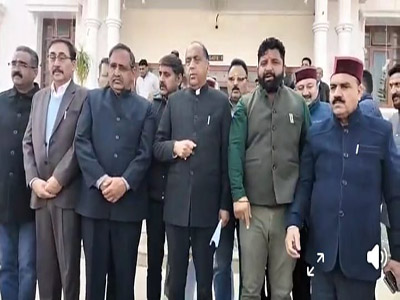Dharamshala/Shimla: "Late Virbhadra Singh always said, ‘If I have to open a school for even one child, I will do it,’" said shrewdly Leader of the Opposition Jai Ram Thakur while talking to the media in Dharamhala after the BJP staged the walkout from the Vidhan sabha.
He accused the Sukhu government of betraying the former Congress stalwart’s vision by closing down 1,865 institutions. However, the BJP’s attempt to lionize Virbhadra Singh to create wedge among the Congress MLAs.
But it raises an uncomfortable question: aren’t all governments guilty of this same game?
The politics of opening and closing institutions has long been a norm in Himachal Pradesh.
Successive governments, irrespective of party, have weaponized administrative decisions for political mileage. The Sukhu government, much like its predecessors, is being accused of dismantling institutions set up by its political rivals.
BJP’s Walkout and Accusations
Today, the BJP staged a dramatic walkout from the Vidhan Sabha. They accused the Congress government of a vendetta-driven approach to governance.
According to Jai Ram Thakur, the institutions were closed without considering their utility or the students affected.
Thakur claimed that the Sukhu government had shut down 1,094 primary schools, saying there were "no students." He dismissed the justification as baseless, arguing, “It’s impossible that not a single child was enrolled in 1,094 schools. This is nothing but political bias.”
He pointed out that remote schools, like those in Rampur and Chaupal, were meant to cater to children in hard-to-reach areas. Closing such institutions, Thakur argued, showed a lack of commitment to education and accessibility.
Sukhu Government’s Defense
The Sukhu government maintains that many institutions opened by the BJP after April 2022 were politically motivated.
They claim these were hastily launched in an election year without proper assessments or resources.
The Chief Minister defended the closures, stating, “Schools with no students and institutions without staff cannot be justified simply to create political optics.”
The Never-Ending Cycle
While the BJP has gone all out in its criticism, it’s worth noting that the party followed a similar script during its tenure.
The Jai Ram Thakur-led government had also reviewed and closed institutions opened by the Congress in the previous term.
This back-and-forth is a recurring pattern in Himachal’s politics. Every government prioritizes opening its own set of institutions, often ignoring the needs and feasibility on the ground. Conversely, closures are used to discredit previous administrations.
Political Vendetta or Genuine Governance?
Both the BJP and Congress have treated institutions as trophies to display their political might. The narrative revolves around which party did more or less, rather than addressing long-term development.
Critics argue that such actions waste public resources and disrupt essential services. Schools, health centers, and administrative offices are opened or closed not based on necessity but on electoral convenience.
The Virbhadra Angle
In its criticism of Sukhu, the BJP invoked late Virbhadra Singh, calling him a leader who prioritized public welfare above politics. The irony is hard to miss. While in power, the BJP was equally vocal about undoing the legacy of Singh, accusing him of favoritism and unplanned governance.
By using Singh’s name now, the BJP is attempting to create a rift between Sukhu and the Congress stalwart’s loyalists. However, the strategy also exposes how both parties cherry-pick legacies for their convenience.
The Way Forward
As Himachal Pradesh continues to witness this tug-of-war, the question remains: will governance ever rise above politics?
The repeated opening and closure of institutions not only drains the state’s finances but also impacts citizens’ trust in public administration.
For now, both BJP and Congress seem content with trading accusations.
The real casualty in this cycle of vendetta politics is governance itself—trapped in a perpetual state of undo and redo.







